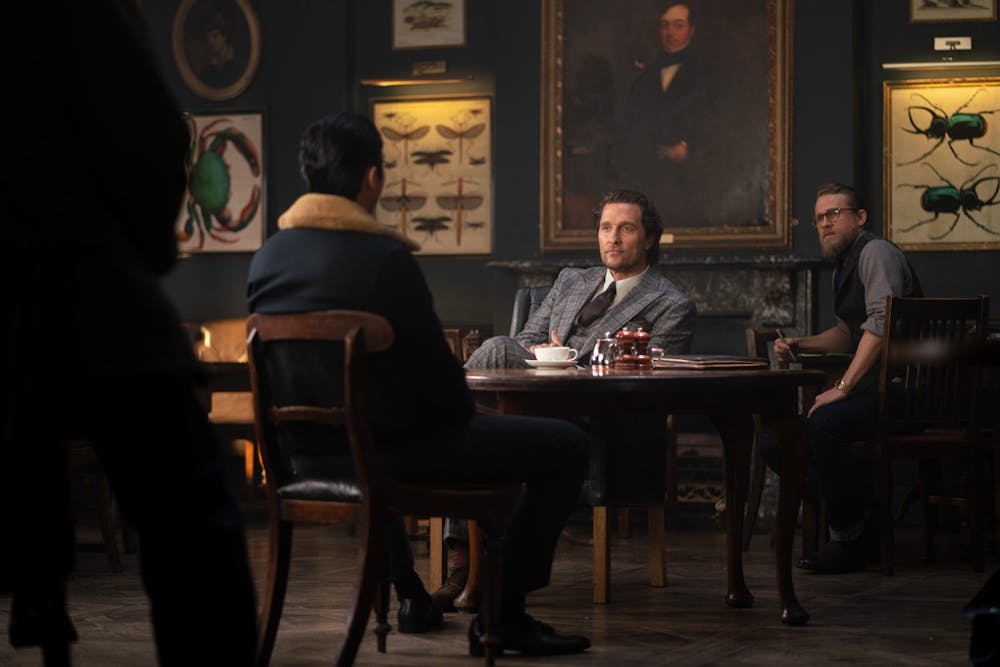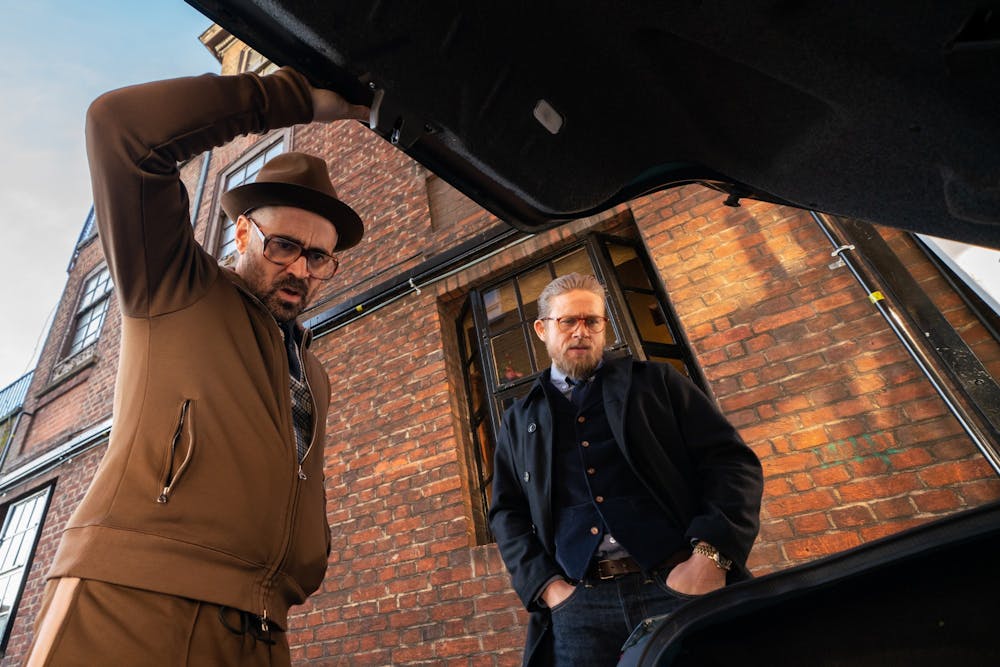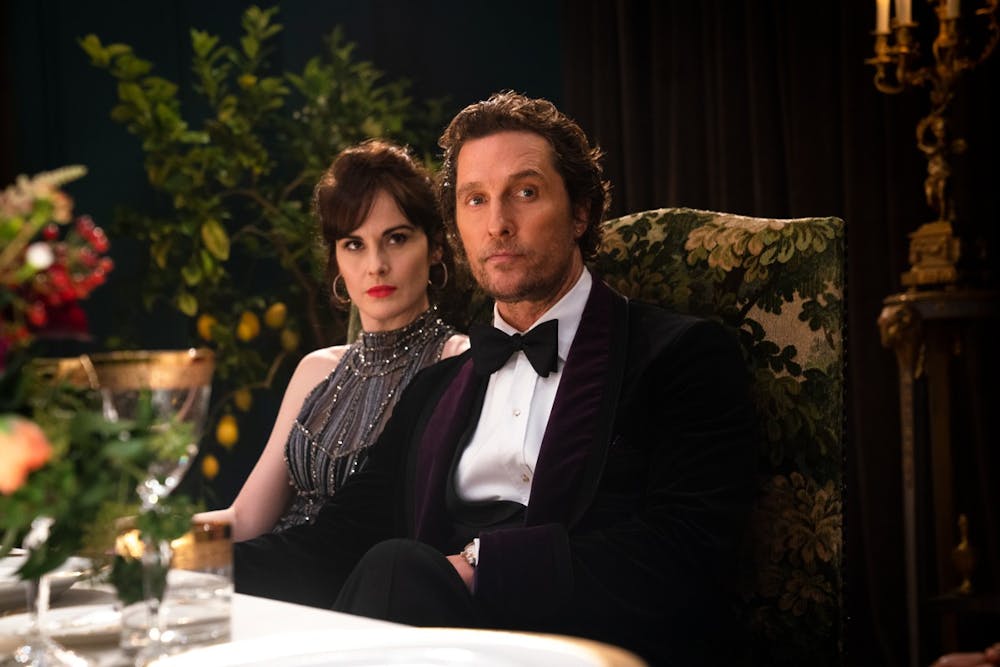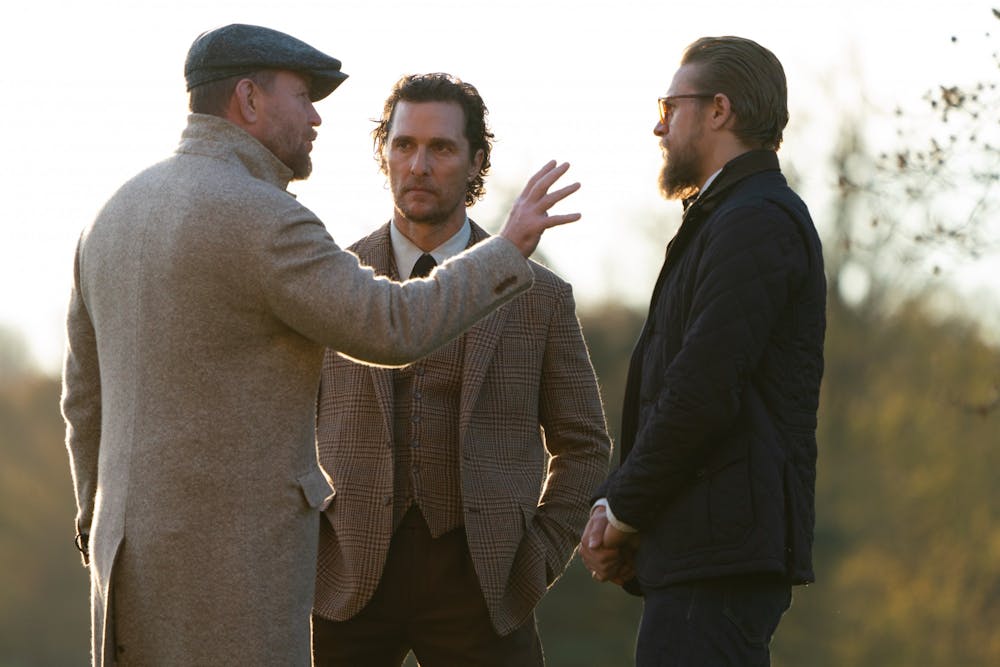Guy Ritchie has returned to his roots. After his slightly peculiar live–action remake of Aladdin, it was unclear if the director would go back to his classic, comedic, fast–paced style of film as aptly displayed in the Sherlock Holmes duology or the funny spy action thriller The Man from U.N.C.L.E. Within the first five minutes of Ritchie’s latest film, The Gentlemen, it becomes clear that this is Ritchie back in his old groove—almost immediately, a character calls another a “deluded shit–eating cunt,” threatens to physically harm him, and then shares a drink in his living room.
The Gentlemen is the story of Mickey Pearson (Matthew McConaughey), the kingpin of a marijuana empire and the self–proclaimed “lion of the jungle” amongst the English elite. The tale of his rise to fame and current troubles are narrated by the irritatingly charismatic Fletcher (Hugh Grant), a sleazy reporter who has been sent to sniff out the details of Pearson’s business for a dramatic cover story. However, Fletcher is trying to make a greater profit by revealing the details to Pearson’s second–in–command, Ray (Charlie Hunnam), forcing Ray to pay him a few million bucks to keep his mouth shut and not destroy Pearson’s carefully cultivated business. Fletcher breaks into Ray’s home, sits him down for a glass of bourbon, and begins the blackmail.

Since it's Fletcher telling the story of Pearson, the film takes on a meta–textual cinematic quality. Fletcher has evidently written a screenplay detailing Pearson’s life and frames the story as a movie in retelling it to Ray. Fletcher has a flair for the dramatics, and he enhances the story and the violence, much to Ray’s annoyance. When Ray tries to correct him, Fletcher replies that “every movie needs a little action.” When Fletcher tells a story incorrectly, the movie “rewinds” to replay the moment as it actually happened.
This clever film–making choice allows the movie to be outlandish and heightened with little care for reality, since, in fact, it’s all an over–dramatized retelling of events. Fletcher’s narration over the entire film creates an exciting, sometimes racy commentary, keeping the adventure moving forward and the audience always in the know.

It's important to consider just how British The Gentlemen is. Characters call each other “cunts” with little hesitation or provocation. Coach (Colin Farrell) and his crew wear a set of matching, very British plaid tracksuits. There's an extended reference to PigGate, showcasing a character getting manipulated by a group of gangsters after they’ve drugged him up and filmed him having intercourse with a pig. The humor style itself, often focused on outlandish cusses, comedic framing of violence, and quick, overlapping dialogue, has become a trademark of Ritchie's. To some, this style may seem alienating, but fans of Ritchie will enjoy The Gentlemen as much as any of his previous works.
That said, the lengths to which this off–color humor goes is questionable. Dry Eye, played by the Malaysian–English Henry Golding, gets a number of jokes hurled at him through Fletcher’s narration based on his race. He's called a "Chinaman" half a dozen times, though Fletcher says that it's impossible for anybody to tell what country he's from. Matthew, who is Jewish and aided by his “Mossad Crabs,” also has a number of quips at his expense. The trope of a wealthy Jewish man controlling business is called upon by Fletcher multiple times. While these quips seem to be in the crass style of British humor (Fletcher’s insults are certainly tongue–in–cheek), their presence is a little questionable in a film that's mostly just about a white guy running a weed empire in England.

While Pearson is clearly the protagonist of the story, the smaller characters are more interesting than our lead. McConaughey is strangely uncharismatic in a film where his charm ought to be up to eleven. His wife Rosalind, the “Cockney Cleopatra to [his] cowboy Caesar,” played by Michelle Dockery, is underutilized, apart from one wonderful scene facing off against Dry Eye. Matthew is sly and clever, always with a trick up his sleeve, but never given a large crescendo moment. Yet, most interesting are Fletcher and Ray, both with some untold backstories that we never quite get to see, always in the background but never themselves explored.
Ritchie’s dialogue is clever and biting, classically crude while being delivered in a quick, overlapping fashion. While the film has its comedic scenes, it appears that Ritchie has slightly settled down and mastered an occasionally more serious tone, building tension with steady camera shots and silent backgrounds. Cuts between two high–stakes moments are executed to encourage anxiety in the audience.
Despite any maturity in film–making techniques—this movie seems more elegant and well–executed than Sherlock Holmes in terms of cinematography and editing styles—the humor is far from grown–up. While the plot is interesting and the movie keeps its audience aware and intrigued for its runtime, the lack of focus on certain characters and the excessive unsavory jokes make some parts of The Gentlemen harder to stomach. If you can sit back, ignore the smutty insults, and enjoy some good old–fashioned British humor, then this movie will be your perfect match.

